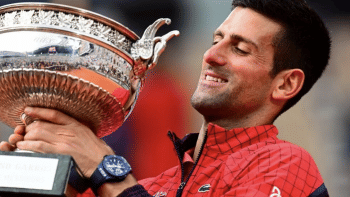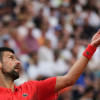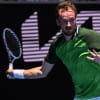Karma is Novak Djokovic

With Novak Djokovic, there is a recurring sense of destiny – almost a cosmic force of "what goes around, comes back around." As Daniil Medvedev secured his place in the US Open final, it was evident that the same fate was once again at play. This highly anticipated rematch harked back to the US Open 2021 final, where Medvedev, defying all expectations, clinched his maiden grand slam thwarting Djokovic's historic quest to win all four grand slams in a single year. This time, however, different forms of pressure emerged. But since pressure is a privilege for Novak Djokovic, he adeptly embraced it.
To understand karma's role here, one must delve into Djokovic's intricate relationship with the crowd in New York. From the onset of his career, he found himself on shaky ground with local supporters. In 2008, after defeating the American Andy Roddick, the then 21-year-old suggested in his on-court interview that the crowd would be against him due to Roddick's accusations of Djokovic feigning injuries. This statement did not sit well with the audience, initiating a two-decade long relationship marked by its fair share of highs and lows.
Then in 2011, Djokovic faced the poster boy of tennis, Roger Federer in the semifinals. At match point down, he delivered an audacious return. To celebrate, Djokovic raised his arms wide open, almost as if to say, "Support the other guy all you want, but I will win this match." He saved three match points and eventually won the match. Federer in his post-match interview attributed Djokovic's shot to "good luck." Eight years later, this came back to haunt Federer at Wimbledon 2019. Djokovic once again faced three championship points and executed his return with surgical precision. The message was clear: it was no luck; it was a mastery of skill. He went on to win the title and to celebrate, Djokovic sat down, plucked a blade of grass and nodded his head in a manner reminiscent of his iconic 2011 moment.
Throughout his career, there have been many moments that have defined Djokovic, not just as a player but as a human being. Outbursts of emotions, racquet-smashing incidents, and occasional tantrums are all facet of his personality that he has fully embraced. Despite being often referred to as a machine due to his unstinting dedication and commitment to the sport, it is these moments that reminds us that beneath the veneer of a flawless tennis player lies an imperfect man. He has his flaws which are frequently magnified in headlines. Yet, it is precisely these imperfections that set him apart from other players.
In 2015, Djokovic found himself facing Federer in the final once more. The crowd that evening was unforgiving. Every error he made was met with exuberant cheers, as if it was the final point. Even when Djokovic encountered an unfortunate slip resulting in a cut to his elbow, the spectators did not waver in their enthusiasm. When he ultimately triumphed, his celebration was not one of relief but rather of conviction. He looked directly at his box, pointed at himself and then pointed back at his team.
Throughout his career, there have been many moments that have defined Djokovic, not just as a player but as a human being. Outbursts of emotions, racquet-smashing incidents, and occasional tantrums are all facet of his personality that he has fully embraced. Despite being often referred to as a machine due to his unstinting dedication and commitment to the sport, it is these moments that reminds us that beneath the veneer of a flawless tennis player lies an imperfect man. He has his flaws which are frequently magnified in headlines. Yet, it is precisely these imperfections that set him apart from other players. In his unique way, he remains true to himself, regardless of what the public think about him. The public opinion and controversies however do affect him, as he has openly acknowledged. But over time, he has learned to reconcile with them and continue on despite the noise around him. And the noise, packed with negative energy, continues on. Whenever he attempts to adopt a more amiable persona, the narrative often claims that he is trying too hard; whenever Djokovic refrains from doing exactly that, the narrative shifts and elicits comparisons to why Nadal and Federer might be more beloved.
In 2021, the pressure was paramount, and Djokovic faltered. He cried into his towel and broke down in the middle of the final set of the match. The burden of history bore relentlessly. His remarkable run that year marked the first time a player had won all three slams in a row from the outset and a win would have secured a record twenty-one grand slams marking the most any men's singles player had won at that time.
However, Daniil Medvedev was also running high in confidence and that confidence outweighed Djokovic's desire. On a court where he had been regularly vilified, he was suddenly greeted with an unprecedented outpouring of affection. This display of love was something he was unfamiliar with, for he had learned to harness the hate as fuel. Yet ironically, on that very night as positivity fueled around him, he could not handle it. He lost.
In 2022, he faced more challenges that have been widely documented. He was deported from Australia for breaching border rules and not being vaccinated against Covid-19. His absence opened the field and Rafael Nadal secured his 21st grand slam in the very court where Djokovic had won the most. Nadal then went on to win French Open, taking his tally to 22. From having the chance to lead the race, Djokovic was thrown off the course. He had to catch up and salvage his reputation, all of which he eventually did.
This year, he returned to Australia, and despite heightened pressure, he answered back in the manner he knows best: winning the entire tournament. When Djokovic secured the victory, he gestured to his head, wearing a resolute and determined expression on his face. It was a testament to the power of his mentality, which is undoubtedly the cornerstone of his victory. Yet, once he made his way to his box, he succumbed to a torrent of emotions. In the comforting embrace of his mother, he released the emotions he had held in for a year.
In June, fate answered Djokovic's call again and he lifted the Roland Garros, cementing his status as the only male singles player with 23 slam titles. It was a poetic reply as this was the very court where Nadal had claimed victory fourteen times.
Two weeks ago, as Djokovic landed in New York, having won two out of three slams, the pressure of pursuing a calendar grand slam had lifted. However, a different kind of pressure loomed – the need to reaffirm himself, having been denied entry into the US for the past season for reasons akin to his situation in Australia.
In the semifinals, he confronted America's rising star, Ben Shelton, with the unforgiving crowd at Flushing Meadow solidly behind their fellow countryman. Shelton's exuberant celebrations at every point began to get on Djokovic's nerves. So, when he emerged victorious, he staged a playful imitation of Shelton's celebratory ritual – picking up an imaginary phone, answering it, and theatrically hanging up. It was in many ways a move signalling his readiness to challenge the status quo. By now, one can say that Djokovic has wholeheartedly started to embrace the role of the occasional villain. He understands that in the theatre of sports, there are moments when the hero and the antagonist share the same stage, and he is unafraid to play either role.
Djokovic's journey to becoming the Novak Djokovic that he is today, was far from an overnight transformation; it required years of unflinching determination and uncompromising effort. He works exceptionally hard, sometimes even too hard. He is a perfectionist, constantly refining every aspect of his game to improve. He reads his opponents like a book and then translates the lessons onto the court.
However, the best version of tennis he plays is when he is fuelled by something greater than just the motivation to win. It's his ceaseless desire to prove people wrong that makes him become unbeatable. When he is against the wall, he jumps the highest. Many admire him for that, myself included. There is a certain allure in witnessing someone who does not always conform to other's expectations. That is probably why he has now ventured into a place where no one has ever been, the summit of the sporting world, transcending tennis.
In last weekend's final, the crowd once again embraced Djokovic and his name reverberated through the ground. This time he prevailed, defeating the same opponent who had bested him two years ago with somewhat of a similar score line. This marked his 24th grand slam title. It was a fitting culmination – game, set, and perhaps a touch of karma – a mix of what makes him Novak Djokovic.
Raiyan Binte Rafiq is a sports columnist for The Daily Star. She is currently pursuing an LLM, while freelancing for INDIVISA. She also oversees recruitment at Next Level Sports Management based in Bangladesh.

 For all latest news, follow The Daily Star's Google News channel.
For all latest news, follow The Daily Star's Google News channel. 











Comments